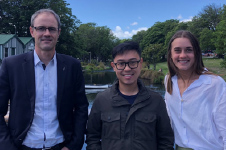
Professor Tim Woodfield, Dr Khoon Lim, and Ms Gretel Major. Absent: Mr Jeremy Simcock and Professor James Crowley.
The winning team in this year's University of Otago Translational Research Grant (TRG) competition has members based in Christchurch and Dunedin.
The TRG, open to researchers in the Division of Health Sciences, is an initiative to assist researchers in the pursuit of research that translates into societal and health benefits.
A team led by Dr Khoon Lim, Professor Tim Woodfield, Ms Gretel Major and Mr Jeremy Simcock (University of Otago, Christchurch) and Professor James Crowley (University of Otago, Dunedin) won with a project investigating new methods of soft tissue reconstruction.
Autologous fat transfer has gained widespread popularity as dermal fillers, or as treatments for congenital defects or burn repair. The process often includes extracting a patient's own fat from one area, to transfer it into other areas of the patient which needs treatment. As the transplanted fat originates from the same patient, immune rejection is thus not a concern. The fat transfer market is estimated to be valued at US$4.2Billion by 2022. In their project, they will use a technology that they have developed to provide structural stability to the fat tissue prior to it being transferred back into the patient. This will provide surgeons with better control over the shape and mechanics of the fat tissue. Presently, patients may require multiple surgeries due to fat resorption. The team hopes their technology will significantly reduce the number of surgeries needed to achieve a good outcome, and will accelerate the healing time.
The first patient group who will receive this new technology are those undergoing breast reconstruction after mastectomy. This research is important in helping with psycho-social morbidity associated with mastectomy in patients with breast cancer. The research team believes that their technology that focusses on modifying patients' own tissue to provide structurally-enhanced fat grafts, holds high potential to repair contour defects and negate the need for artificial implants, tissue fillers, and multiple surgeries. They are particularly interested in characterising the chemistry behind this process so that it can be tailored to each patient. To achieve these goals, the team uses a multidisciplinary approach arising from the diverse team of clinicians, cell biologists, synthetic chemists and bioengineers.
Health Sciences' Associate Dean, Research Commercialisation, Professor Paul Glue says the selection panel for the 2020 contest – which included an external innovation expert, as well as staff from both the University and Otago Innovation (OIL) – was very impressed by the quality of the applications.
The 2020 contest saw OIL offer coaching on how to 'pitch' a presentation of this type – and a number of the applicants took advantage of this learning opportunity.
Professor Glue says as well as working with Dr Lim and his collaborators, OIL staff will also engage with and encourage the other applicants in their translational research efforts.